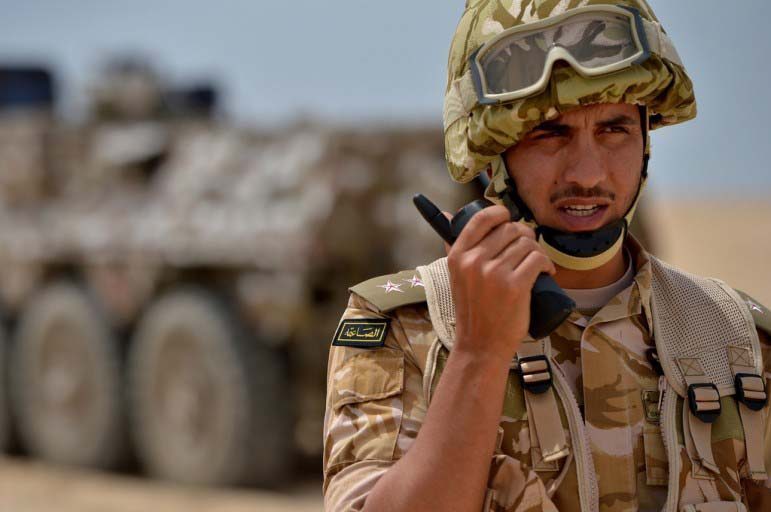
Qatar has joined a new “Islamic and military” anti-terrorism coalition led by Saudi Arabia, amid calls on MENA countries to step up efforts to fight militant groups like ISIL.
The coalition’s operations center will be established in Riyadh and will “coordinate and support military operations to fight terrorism, develop programs and necessary mechanisms to support its efforts,” according to a statement published on the Saudi Press Agency (SPA) yesterday.

The statement said that the coalition was attempting to unify the efforts of its 34 members – which also include the UAE, Kuwait, Bahrain, Egypt, Tunisia, Turkey, Malaysia and Pakistan – in fighting terrorism, which is a “heinous crime” against humanity and is rejected by Islam and other religions.
Notably absent from the coalition are nations deemed close to Iran, including Iraq and Syria.
The new coalition will not be limited to targeting ISIL, but will also pursue terrorist organizations in some of those countries, as well as in Libya, Egypt and Afghanistan, Reuters Arabic reported Mohammed bin Salman, Saudi Arabia’s defense minister and deputy crown prince, as saying during a press conference in Riyadh yesterday.
He added that each state in the coalition will “participate according to its capabilities,” Al Jazeera reported.
Challenges
David Roberts, a lecturer at King’s College London, told Doha News that Qatar likely had little choice but to join the coalition:
“This is not a battle that (Qatar) can easily sit out, unless it wants – once again – to be simplistically or erroneously painted as a ‘terrorist sympathizing/supporting’ state,” he said via email.
Qatar has repeatedly come under fire in recent years amid allegations that it supports militant groups and is a permissive conduit for fundraising in support of armed organizations operating in the region.
The country’s top officials have repeatedly rejected those claims.
Roberts also said he was skeptical that the new military coalition would be effective in combating terrorist organizations, as it is very difficult to create “cohesive, military coalitions – let alone deciding on a process of who is a terrorist or how this group or that group should be targeted.”
International pressure
The announcement of the new coalition comes on the heels of a speech by US President Barack Obama on Monday in which he called on countries in the Middle East to do more to fight ISIL:
”Just as the United States is doing more in this fight, just as our allies France, Germany and the United Kingdom, Australia and Italy are doing more, so must others,” he said, according to the New York Times.
Obama added that US Secretary of Defense Ashton Carter would travel to the Middle East “to work with our coalition partners on securing more military contributions to this fight.”
The newspaper said the Obama administration is not asking Saudi Arabia or other Gulf allies send ground troops into Syria.

Instead, they’d like to see Arab countries help recruit and assemble a Syrian Arab force of ground troops that’s willing to fight ISIL.
Obama also pointed out that ISIL has so far lost around 40 percent of populated areas they once controlled in Iraq, adding that progress against the group by the American-led coalition “needs to keep coming faster,” according to NYT.
Qatar’s military operations
Qatar is already part of a Saudi-led military campaign in Yemen and has contributed some 1,000 ground troops, 200 armored vehicles and 30 Apache combat helicopters, in addition to participating in an aerial bombing campaign in support of the deposed Yemeni president in his fight against Houthi rebels.

Last month, the first Qatari soldier was killed in Yemen as part of Operation “Decisive Storm.”
The Gulf state is also part of ongoing US-led military campaign against ISIL, alongside other Gulf and Arab countries.
Although it participates in the aerial bombing campaigns against ISIL, it has kept a “low profile” during these attacks, providing support and surveillance rather than directly attacking the group, according to experts.
Attacks
Some of Qatar’s fellow GCC countries have faced several bombings this summer believed to be carried out by ISIL, including attacks on Shia mosques in Kuwait and Saudi Arabia, that left dozens dead.

However, despite threats posted on ISIL online forums to bomb the 2022 World Cup, experts recently told Doha News that a terrorist attack against Qatar is unlikely.
Nevertheless, a string of militant attacks around the world this fall has left many people on edge.
That includes a mass shooting in California by suspected ISIL sympathizers who killed 14 people. And last month, ISIL claimed responsibility for the suicide bombing of a Beirut suburb that left at least 41 people dead as well as the coordinated attacks a day later across Paris that killed more than 130 people.
There are also suspicions that the group was responsible for the bombing of a Russian airplane flying over Egypt late last month, resulting in the death of all 224 passengers and crew onboard.
Thoughts?







